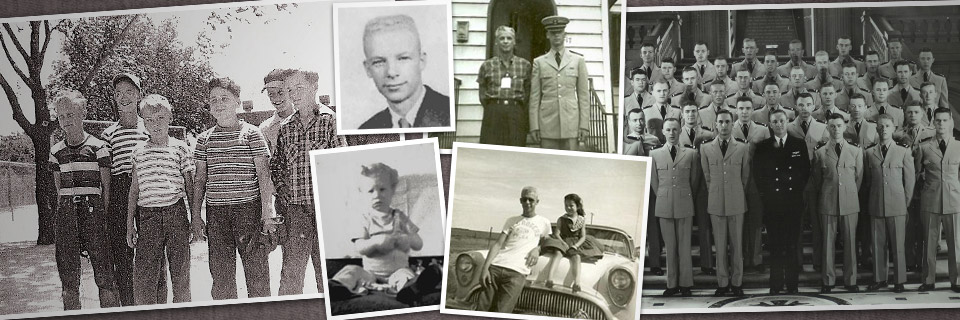Before the War
Warrior in the Making
I think somehow we learn who we really are and then learn to live with that decision. — Eleanor Roosevelt
I was born on a hot August day in Tulsa, Oklahoma in 1938. Of course it was hot. It was Oklahoma in August. I was lucky not to have been born earlier. Too soon, and I would have suffered through the Great Depression and the Dust Bowl, two disasters we Okies were just beginning to climb out of, along with many other Americans. Born even earlier and I would surely have volunteered or been drafted for the great conflagration of World War II.
As it was, my timing was pretty good. I turned seven just a few days before V-J Day, when America and the world were just beginning the post-war mend. My father, R.B. Butler, had served in the war first as a civilian instructor for the Army Air Corps, in Chickasha, Oklahoma, and then as a co-pilot for Braniff Airlines, in Dallas, Texas. At the end of the war, he felt both loyalty and opportunity to return to Tulsa and join his mother in a budding real estate business. It was to be a decision he regretted later in his short life.
In many ways I was just a normal boy growing up. I had buddies I played sports and of course war games with. I had paper routes for five years that taught me responsibility and put a little money in my pocket. I learned how to hunt and fish. Independence was always my goal. But I wish I could say the same for my parents. Effie Mae and R.B. Butler had problems, themselves and with each other. My mom with prescription drugs – or maybe her head just wasn’t right – and my dad with alcohol. When I was in my early teens, they divorced. I lived with my father, and essentially wound up caring for him when he should have been caring for me.
There were some unusual aspects to my childhood. I didn’t fit in with the racism and anti-Semitism of the local Southern culture of the time, and of my relatives. In fact I was still in grade school when I chastised my family for using the word “nigger.” I was relentless enough so they stopped, at least when I was around. I also got punched by a school bully when I told him not to call my friend Leonard a “dirty Jew.” And I didn’t fit in with the Southern Baptist religion that everyone in my family ascribed to, actually rejecting it when I was 13 years old.
But I certainly wasn’t a purist. I accepted my father’s rather severe teachings of homophobia. They seemed to fit with his macho repetitions to “not be a sissy.” Manliness and patriotism were huge, coming out of the war years with all the returning veteran fathers. There was a lot of macho jingoism about how great our country was, and with it a desire in almost every boy I knew to join the armed forces when we were old enough and to be a hero. Or at least to serve our nation. I also accepted the cultural norm that women were supposed to stay at home, take care of the kids, and obey their husband.
Speaking of the nation, I knew only a small part of it back then, in terms of people and geography and climate and thinking. But I had an aunt who had gone to California, and when she came back for a visit, she gave grand accounts of how wonderful was The Golden State. I was ten at the time, but I knew as clearly as if it had been written on a stone tablet that my dream goal was to go there.
It would take me 14 years to get to California. First I had to get through high school, and start college with a NROTC scholarship at Oklahoma University in 1956. That year my very savvy Naval Science professor steered me onto a new path and out of the rut I was digging for myself. His direction and support resulted in me competing for and getting one of the two hundred presidential appointments to the United States Naval Academy in 1957.
I’m skipping over a lot here, including my baby sister who is one of my best friends to this day, learning to play the piano and the love of music that I also have to this day, and learning to fly, which helped me to become a Navy fighter pilot, until April 20th 1965, when I was in the skies over North Vietnam, and…well, we’ll just leave this part of the story here. The details are in my book.
There are some photographs from that time, my growing up, my family, my Naval Academy years and my Navy pilot stint. Plus there’s a copy of President Kennedy’s brilliant speech to my Naval Academy graduating class in June of 1961. And take a look at the short summaries I’ve written about my Vietnam experience, and about the post-war period. Both stories have photographs that chronicle this incredible time in our nation’s history, and as it happens, my own.
